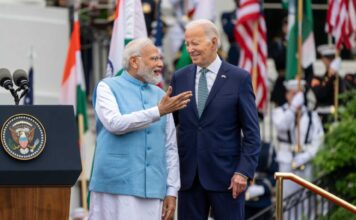By Basab Dasgupta
In physics there is a phenomenon known as the “observer effect” which describes the impact of the observation or measurement process on the result for a quantity that is being measured. For example, if we want to measure the temperature of an object with a thermometer by placing the thermometer in contact with the object, the thermometer will extract some heat from the object and possibly change its temperature. If we measure tire pressure using a gauge, insertion of the gauge in the tire valve immediately releases some air from the tire, thus altering the pressure we are trying to measure.
On a microscopic level, this leads to uncertainties in the simultaneous measurements of position and momentum of a particle, as described by the famous Uncertainty principle of Heisenberg. We can never precisely determine both the position and momentum at the same instant. To determine the position of an electron, for example, in an imaginary thought experiment, a photon must be reflected by the electron in order to be “visible” and as a result the momentum of the electron would be altered because of the collision between the photon and electron. This introduces an uncertainty in the electron’s momentum.
The entire subject of quantum mechanics embraces this uncertainty. This results in wave-particle duality where particles exhibit wave behavior on some occasions and particle behavior at other times. One could say that this wave nature of particles is the ultimate cause of the uncertainties.
This observer effect can be generalized to a much wider arena. In fact, this effect (change in an action caused by the process of observation) is present in ALL activities that we engage in and we should redefine any action as a combination of the action itself plus the impact of the observer on the action in order to be completely accurate. This is true no matter what activities we are involved in: professional work, sports, music, politics, household chores and so on. An incomplete description of an event gives rise to unnecessary confusion, debate and wrong follow-up actions.
Take sporting activities as an example. There is no point in organizing such an event if there are no spectators and cheering of the spectators would definitely have an impact on the performance of an athlete. It does not make sense for an author to write a book if no one is going to read it. How the book would be received by the readers is definitely always on the author’s mind.
Take in blurb Highlight: Even a political speech is intended to excite/inspire the audience and this anticipated reaction is factored into the speech itself.
It is well established that behavior of people, even when they are doing some mundane routine things – such as eating, driving a car or going to the bathroom, changes if they know that they are being watched.
For any given type of activity, we can divide all people into two groups: one group whom I would call “performers”, take the initiative and do something, while the other group consists of “observers”. The actions of the performers can be constructive or destructive. Constructive activities result in tangible items like music, essays, paintings, buildings, contests, new law and so on.
A destructive performer destroys things. He/she can be a protester, a soldier, a robber, or an arsonist. An observer can be a critic, a newspaper editor, a fan or admirer, a diner at a restaurant, an art enthusiast, a media “pundit” who either supports or dislikes the actions generated by the doers.
The observers do not produce anything of their own. They basically go around by quoting the experts in the field, comparing performances, drawing analogies, speculating “what if” scenarios, establishing plausible theories to justify their opinions and so on. They try to influence others to think along the same line.
However, these two groups need each other. Clearly, there will be no need for observers if there is nothing to observe and observers need the performers. Conversely, performers need the observers. The classic symbols of a doer and an observer in Hindu mythology are Krishna and Radha.
Take in blurb Highlight: Krishna is the performer (by playing the flute) and Radha is the appreciative listener or observer. The two groups not only need each other, presence of one group automatically ensures origination of the other group.
Apart from Heisenberg’s principle, electromagnetic fields provide another example of the performer/observer concept from physics. The electromagnetic field is an intertwined combination of an electric field (or E-field for short) and a magnetic field (or B-field). According to Maxwell’s equations, a time-varying E-field automatically generates a B-field. This is similar to the scenario of the action of a performer automatically generating critics.
One very intriguing mathematical aspect of these fields, using the language of vector algebra, is that divergence of the vector B is always zero, but its curl is non-zero. The entities “divergence” and “curl” have simple physical interpretations to the non-mathematician readers if we consider the activities of performers and observers to be represented by flow of water. Divergence in that case would imply a “source” or “sink” of water and curl would indicate presence of a whirlpool. A non-zero divergence is positive for constructive actions (source of water) and negative for destructive actions (sink). Vectors representing the actions of observers, on the other hand have a zero divergence because they do not produce anything new. Non-zero curl is a perfect metaphor for the cycling narratives in the observers’ action.
The two examples from physics show that the wave nature of quantum waves or electromagnetic waves are the root causes of this performer/observer interdependence. It is logical to speculate that there is a wave-like fluctuation in the relationship between any performer-observer pair.
As a result, no phenomenon in this world can be described precisely. There is always going to be some “fuzziness” or uncertainty in our description. We cannot say if the performance of a musician was perfect; only that it was great or one of his best (presumably because the reaction of his audience had an impact).
This leads me to the conclusion that our description of any event must include the observers. It is not sufficient to say that V. Kohli hit a six or Donald Trump insulted Joe Biden, or my wife is cooking a meal. We should say that V. Kohli hit a six in the match against Australia in a fully packed Brabourne Stadium, Trump mocked Biden at a campaign rally in San Antonio, Texas, and my wife is cooking for a group of ten people we have invited to our home. Just like Radha and Krishna together complete the divine picture, description of the performer and observer together offers a complete account of what is going on.

Basab Dasgupta has a doctorate in physics from University of Wisconsin and worked with Sony as Vice President of an operating division. Retired, he now lives in San Clemente, CA.
Disclaimer: The views expressed are not necessarily those of The South Asian Times













